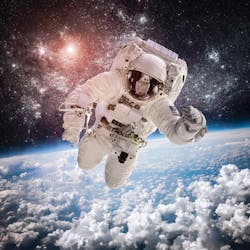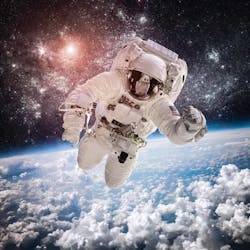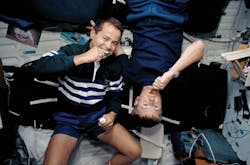Hygiene in orbit
The space program monitors the new heights for oral care
BY Andrea Kowalczyk, RDH, BS
Having spent more time on this planet than I care to admit, I have come to believe that truth is stranger than fiction. If someone had told me that my career as a dental hygienist would put me in daily contact with NASA astronauts, I would never have believed them. But amazingly, that is exactly what happened.
In 2007, my husband was hired to work as a flight control engineer on the International Space Station, working in mission control at the Johnson Space Center in Houston.
I grew up in Houston and fondly remember visiting the Johnson Space Center on grade school field trips, marveling at the massive Apollo rocket, the tiny and terrifyingly claustrophobic capsules designed to take humans to space, and the ethereal space suits on display behind museum glass. Bill and I were excited to be joining the NASA family.
In 2014, I was working as an independent, temporary hygienist - when not traveling for my consultant position. I was called to fill in at the office of John D. Hatcher, DDS, in Pasadena, Texas. Living so close to the Johnson Space Center, we saw our share of local businesses with "space themed" décor, and Dr. Hatcher's office was no exception. On the walls were gorgeous photos of Earth from space, all of them autographed by the astronauts who had captured the awe-inspiring images. I assumed Dr. Hatcher was a "space aficionado" whose hobby was collecting these images and displaying them for patients, but it wasn't until I went into the hygiene operatory and noticed an autographed photo of a tube of toothpaste floating in space that I became seriously intrigued.
Imagine my surprise when the office manager told me I had just entered the office of the dentist for NASA's astronaut corps! That fact meant I would be treating Dr. Hatcher's patients, many of whom are active astronauts and their immediate family members.
I won't lie; I quickly became nervous. I would be cleaning the astronauts' teeth. Folks assume that if your husband works for NASA, you surely know a few astronauts. The truth is astronauts are an elite bunch, and I had never met one.
Sunita Williams, a 49-year-old astronaut, demonstrates her brushing technique while the author observes from Mission Control in Houston.
The first day in a new office always brings its share of anxiety, but this day was clearly going to be especially unsettling. What if I got nervous and slipped with an instrument while working on an astronaut? What if I ran behind and made a busy astronaut wait too long? My list of "what ifs" was terrifyingly, if not illogically, long.
Thankfully, Dr. Hatcher and his staff were warm, helpful, and (pardon the pun) down to earth. I knew I would be relying on that kindness when I saw there was an astronaut on my schedule that first day.
In retrospect, I should not have been nervous. I made it through that first astronaut appointment with my dignity intact! My patient was very kind. His friendly manner set me at ease immediately. Over the following months, I was called to fill in at Dr. Hatcher's office on many occasions. During that time, I was able to treat a half dozen astronauts as well as many NASA flight surgeons, engineers, and scientists.
Eventually, I relaxed and worked up the nerve to ask my astronaut patients dumb questions, and I never lost the urge to ask for a picture of me, scaler in hand, grinning with an astronaut. Thankfully for the astronauts as well as Dr. Hatcher, I retained my dignity and professionalism and never asked for a selfie!
While I am curious about spaceflight, first and foremost I am a hygienist, so I was eager to ask the astronauts about their oral care routines while in space. Many of the astronauts are on the ISS for six months or longer, so this is a serious and legitimate issue. I knew that over time, weightlessness causes humans to lose mineral density in weight bearing bones, but what about the periodontium? Does extended spaceflight cause astronauts to develop an otherworldly type of periodontal bone tissue destruction not seen on terra firma?
What about brushing and flossing? Does not having running water or a place to expectorate toothpaste present any unique challenges? It turns out it does. Because there is no daily trash pickup in space, such as we enjoy on Earth, everything that gets tossed in the "garbage" builds up. Since real estate is at a premium in such small quarters, one astronaut reported he did not always floss in space because he didn't want to take up more garbage space by disposing of the floss afterwards.
Insights about oral helth in space
I conducted an interview with Dr. John Hatcher to learn more about oral care in orbit. This interview coupled with my own research answered the following questions regarding oral care in space:
How important is oral health for astronauts?
Dr. Hatcher: "Due to the limited ability to treat dental problems in space, oral health is a top priority with astronauts. It is not practical to place equipment and materials on [the] space station that would have such limited use. A procedure that could be easily taken care of on Earth could potentially result in the astronaut's early return to Earth if it is not able to be treated on board."
Can astronauts choose their own dentists?
Dr. Hatcher:"Astronauts can choose their own dentists; however, there are two dentists in the Clear Lake area [Houston] that are vetted by the flight surgeons at NASA that are familiar with the limitations of treating dental problems in space (Dr. Hatcher is one of them). All astronauts must be seen by one of these practitioners annually to maintain their flight status."
Do astronauts have increased risk for oral diseases?
Dr. Hatcher: "So far, there has been no evidence of spaceflight having adverse effects on the oral cavity."
What about challenges around storing and disposing of oral health supplies?
Dr. Hatcher:"There are not really any problems in this area. Each astronaut has personal item storage and oral health items can be replenished with resupply crafts."
What type of water is used for brushing and rinsing?
Dr. Hatcher: "Water on board [the] space station is recycled. Many of the crewmembers brush and swallow the paste followed by a drink of water. Some may brush and spit, but I have not spoken to any that do."
Astronauts brush their teeth during STS-135, the final space shuttle flight.
Another astronaut reported swallowing his toothpaste, as spitting into a sink is not an option. Since swallowing foamy toothpaste is not pleasant, he sometimes did not use toothpaste and, instead, used only water.
Being the hygiene geek that I am, my gears were turning; it seemed I had more questions every day. Dr. Hatcher is responsible for helping NASA stock the oral care kits that go up with missions to the space station. Could he provide the astronauts with nonfoaming toothpaste that's more pleasant to swallow? What about flossing alternatives? Could they bring a power brush to space? I learned from my husband that nothing that needs charging can be brought unless it is a critical item for the mission and approved by NASA; however, there are some exceptions when items are specifically requested by the astronauts and approved for use with ISS power systems. Apparently, power sources on the space station are at a premium as well.
As my questions increased, I began to Google articles on the subject and was surprised to find that very little has been written about oral health in space, at least that is readily accessible to the layman. That discovery, coupled with my own curiosity, inspired this article.
Between my own research, an interview with Dr. Hatcher, and my conversations with my astronaut patients, I pieced together some interesting facts to share. I hope the hygienists reading this find learning about oral care outside our planet as novel and intriguing as I did.
To understand the oral health issues astronauts face, it is important to understand the environment aboard the International Space Station. Here are some interesting facts I dug up:
• The International Space Station marked its 14th anniversary of continuous human occupation on Nov. 2, 2014.
• 215 individuals have visited the space station.
• At the time of the anniversary, the station's odometer read more than 1.5 billion statute miles (the equivalent of eight round trips to the Sun), over the course of 57,361 orbits around the Earth.
• The space station spans the area of a U.S. football field, and weighs 924,739 pounds. The complex now has more livable room than a conventional six-bedroom house, and has two bathrooms, a gymnasium, and a 360-degree bay window.
• Most American astronauts spend roughly six months aboard the station for each mission.
• NASA and the Russian Federal Space Agency have named Scott Kelly and Mikhail Kornienko for a one-year mission aboard the station in 2015! Astronaut Scott Kelly recently began the first-ever, yearlong mission to the International Space Station. The mission will help scientists better understand how the human body reacts and adapts to the harsh environment of space. This is critical to advancing NASA's plans to send humans on a journey to Mars.
• Scott's twin, Mark Kelly, and also an astronaut, will participate in biomedical studies on the ground while his brother is on board the orbiting laboratory.
Getting a toothache is neither pleasant nor convenient no matter where you are, but in orbit, it could be a nightmare. There are written treatment protocols of what to do in the event of a dental emergency, up to and including extractions. These protocols are available to the public on nasa.gov. In order to serve as crew medical officers (CMO), astronauts receive 40 to 70 hours of medical training within 18 months before missions.
However, as Dr. Hatcher noted, prevention is the best strategy, so astronauts are required to have regular exams and cleanings. Of course, being disease free is important so astronauts can be flight ready, and good oral health contributes to overall wellness.
Astronauts have a personal hygiene kit. The kit contains a tube of toothpaste that is often shared between crewmembers. The act of brushing and flossing does not differ from here on Earth, but there are special considerations for the preparation of the brush, the water source, and the disposal of supplies. Because there is no running water, astronauts use a water-filled bag to wet the brush, careful to use only what is needed to avoid floating water droplets. They must swallow the toothpaste or spit it into a tissue.
(Though, as mentioned above, having excess waste is not practical, so the paste is usually swallowed.) Floss must be disposed of, another challenge for astronauts if they choose to use it.
Has NASA research benefitted the dental industry?
Most of us are aware of the commonly used NASA spinoffs or inventions derived from NASA research. Memory foam, scratch-resistant lenses, and freeze-drying are all technologies derived from the space program. Two examples of NASA's dental contributions are a painless probe and water disinfection cartridges for dental water lines.
The US Probe, a fifth generation periodontal probe, could be of particular interest to hygienists. The probe uses a technology originally used to detect cracks aboard spacecrafts. The US Probe is an ultrasonographic instrument that integrates diagnostic ultrasound techniques with artificial intelligence to automatically detect, map, and diagnose periodontal disease painlessly and without error. The probe is awaiting FDA approval.
Having had the opportunity to fill in at Dr. Hatcher's office and treat the astronauts will always be a highlight of my hygiene career. It was truly an unforgettable experience that made me a better hygienist. I was blessed to have been able to get to know these amazing people who literally risk their lives in the cause of mankind's curiosity and advancement. It was an honor that I will file under my "experiences of a lifetime"!
Sometimes, as hygienists, we are unaware of some of the fascinating and unique ways we can put our knowledge and skills to use. As a hygiene coach and consultant, my mission is to encourage hygienists to reach outside their comfort zones. I am hopeful that my experience will help inspire my peers to not shy away from the pursuit of something new and interesting, even when it's intimidating.
As Neil Armstrong said when asked about looking at our Earth from the moon: "I didn't feel like a giant. I felt very, very small."
I know I felt small when entrusted with treating America's heroes, but I persisted and ultimately enjoyed and learned from the experience. My hope is that hygienists reading this will make it their mission to always aim high. RDH
ANDREA KOWALCZYK, RDH, BS, works as a senior hygiene performance coach with Enhanced Hygiene. She obtained a bachelor's degree from O'Hehir University and a post-graduate certification in mentoring. She speaks nationally on hygiene topics, including on how hygienists can avoid career stagnation. She resides in Houston with her husband and son. She can be contacted at [email protected].



